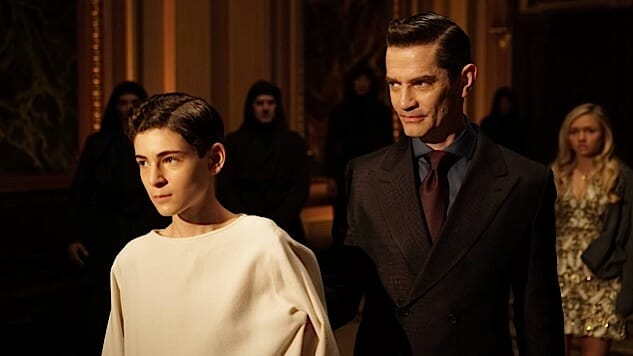Gotham: “Worse Than a Crime”
(Episode 2.11)

The biggest hindrance to Gotham’s second year, which has done a successful job rebooting the series into an unabashed camp-filled romp with focused storytelling, has been its lack of well-rounded characters. One of the worst offenders in the so-called “Rise of the Villains” story arc has been Theo Galavan.
Despite an intriguing backstory and personal history to Bruce Wayne, Galavan (James Frain) has been zestless, offering little more than menacing stares and hollow soliloquies. His importance to the narrative has held the year back, but last night’s “Worse Than a Crime,” the midseason finale, distanced the season from Galavan, and repurposed the character in a curious way for potential use in the future.
The season’s 11th episode picked up where last week left off, with Alfred fleeing Tabitha and her cronies. From there, the hour built in anticipation, with Bruce facing death and his caretaker building a goon squad to save him. Gordon was, expectedly, brought in to lead the charge with Alfred and together the two amassed an impressive amount of both man and firepower (thanks to some help from Penguin) to take on the Order of St. Dumas.
I hoped, the show’s campy tone now in place, the showdown between Bruce’s protectors and those looking to end the lineage of the Waynes would bring a grandiose spectacle. But, the firefight was more a firing squad, as Alfred et. al cut through the monks like they were men in robes. Which, in fairness, is what they were. Father Creel brought a pinch of otherworldly power that was curbed by a timely Harvey Bullock, but otherwise the monks offered little resistance, and far less power than their fancy rituals would lead one to believe.
Lackluster conclusion aside, it was a great deal of fun to watch Alfred and Gordon team up with Oswald for a collective goal. The complicated relationship between Gordon and Penguin is an area the show needs to place emphasis, particularly if it continues to push its heroic detective deeper into the dark. Gordon’s threadbare morality has been obvious since the beginning, making the numerous times Gotham focused on that specific character trait this season galling, but his endpoint in “Worse Than a Crime” was still effective storytelling.
The difference with the GCPD’s white knight in the past ten episodes and the decision he made last night was a distinct apathy. Gordon’s eyes showed no signs of quandary, and that is an intriguing look. I’ve grown tired of the detective’s delusional sense of righteousness, as though he hasn’t been soundly on one side of the line for some time, but that was non-existent in the final moments of the midseason finale. As a character, Gordon still needs to grow into something beyond a screaming teapot, but the idea of him without any real lines is appealing.
“Worse Than a Crime” rectified another of the season’s gross missteps by reintroducing Lucius Fox, played by the captivating Chris Chalk. Since his first appearance late in season one, Chalk has brought a level of grace Gotham is not often associated with, and the prospect of Lucius becoming a regular player after his run-in with Alfred and Bruce earlier this year had me high. Sadly, as soon as he came, he went and for weeks there was naught a peep from the technological wizard. In one of the more bizarre sequences of the season, Fox was reestablished in the show by storming out of the secret office within Wayne Manor, exclaiming that he fixed the harddrive left behind by Bruce’s father. It was as though Fox had spent the last several weeks trapped in the bowels of the old house, and no mention was made to clarify just what he had been doing all this while. Confusing, but also in line with many of the finer details Gotham washed over in its year and a half on air.